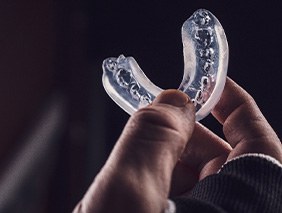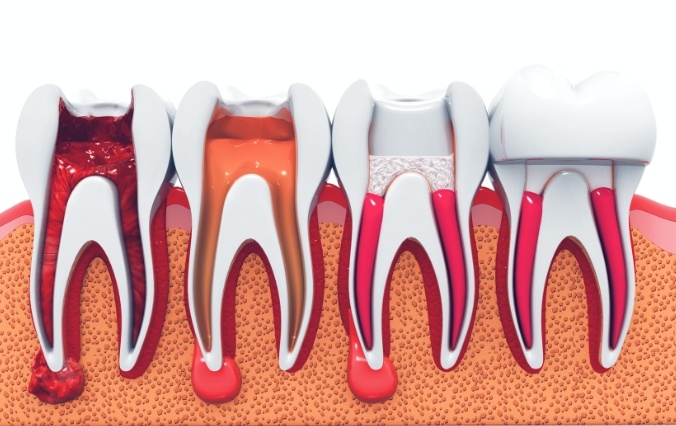Emergency Dentist — Broken Arrow, OK
Solutions for Relieving Dental Pain
One moment your smile might feel perfectly fine, the next it could be in extreme pain. Dental emergencies strike when you least expect them to, and they require immediate attention. Our team at Berkshire Dental Group will see you as soon as possible to help you find relief and get to the root of the problem. There’s no time to lose when your teeth and gums need urgent care – call us immediately as soon as you notice a significant oral health issue for emergency dentistry in Broken Arrow.
Why Choose Berkshire Dental Group for Emergency Dental Care?
- Dental Office with Advanced Dental Technology
- Same-Day Emergency Appointments Available
- One Stop for a Full Menu of Dental Treatments
How We Treat Dental Emergencies

First things first, you should contact us to explain your symptoms. An experienced team member will provide instructions to help you manage your situation at home. Depending on the extent of your emergency, we’ll pencil you in that very same day.
When you get to our office, we’ll conduct an oral examination to determine the best treatment method. Once we identify the root of the problem, we’ll do everything we can to relieve your pain. Don’t worry – we’ll review your options with you and explain the costs involved. After a treatment plan has been created, we will ensure you receive the quick and compassionate care you deserve.
The Most Common Dental Emergencies
Dental emergencies come in all forms. Some are caused by not brushing and flossing properly while others are the result of sudden accidents. The type of dental trauma you’ve suffered will determine the kind of care you need. We will be sure to give you some tips for managing your situation before you get to our dental office. Below, you can learn about some basic steps to keep in mind for emergencies that a lot of people experience.
Understanding the Cost of Emergency Dentistry

During a dental emergency, we have two goals: stopping your pain and saving your teeth. That said, many patients are worried about something else: the price. If that’s the case for you, don’t worry – we can provide you with an estimate of the cost of your care at your visit. You can also read on if you want to learn more about the price, including why it’s not the same from patient to patient.
Every Dental Emergency is Different – Here’s Why

To put it simply, there isn’t a one-size-fits-all cost of emergency dentistry in Broken Arrow because there isn’t a one-size-fits-all treatment. In order to provide you with an estimate, we need to first complete a comprehensive oral exam and determine the service (or combination of services) that is needed to restore your healthy, pain-free smile. Rest assured, we’ll also take the time to discuss how insurance and third-party financing can be used to help you pay for treatment without breaking the bank or upsetting your monthly budget considerably.
Does Dental Insurance Cover Dental Emergencies?

Not only do many dental insurance plans cover the cost of one emergency exam per year, but they also usually cover a portion of the cost of essential restorative care. So, if you are insured, take a look at the fine print on your plan to familiarize yourself with your coverage! Our team at Berkshire Dental Group also welcomes many of the nation’s leading providers, including Guardian, Health Choice, Humana, and MetLife, and we’d be happy to assist in the process of understanding and utilizing your benefits.
Other Options for Making Dental Emergencies Affordable

Don’t let not having dental insurance stop you from getting the emergency dental care you need! After all, that’s just one of the financial solutions available at our office. Here are a few additional ways you can save:
- Our Dental Membership Plan – After you pay the low annual fee, you get immediate access to several benefits, including a discount on treatments completed at our office.
- Flexible Financing – If you’d prefer to break up the total cost of your care into smaller, more budget-friendly chunks, we have good news: you can with CareCredit!
- Special Offers – Throughout the year, we offer periodic specials, like a $99 Emergency exam and X-Ray. If you’d like further details, visit the special offers page on our website or give us a call!
Take Care of Your Smile, Save Money!

If you’re worried about the pain, stress, or cost that comes with common dental injuries, like chipped, cracked, and knocked out teeth, you’ll be happy to hear that they are largely preventable. The key is incorporating healthy habits into your routine, including flossing consistently, wearing a mouthguard during sports, and coming to our office every six months for a checkup and cleaning.
Important reminder: If you start to experience abnormal symptoms, including pain when biting down or bleeding when you floss, don’t wait – schedule an appointment with our emergency dentist in Broken Arrow right away.
Keys to Preventing Dental Emergencies

Although you can never predict when a dental emergency might occur, thankfully, there are several proactive steps you can take to help prevent them. For instance, regularly cleaning your smile and investing in proper preventive care strengthen your teeth and gums, making them less vulnerable to injury, decay, or disease.
Continue reading to learn more about how you can avoid common concerns that might otherwise lead to an emergency, and please feel free to contact our office for an appointment if you require immediate assistance!
Implement an At-Home Oral Hygiene Routine

Your mouth is full of bacteria eagerly awaiting any opportunity to penetrate your enamel and connective tissues. If they’re allowed to thrive, they can form plaque on your teeth and along your gumline, which can contribute to oral issues such as cavities and periodontal concerns.
Fortunately, this can often be easily avoided by brushing and flossing twice daily. Our team recommends thoroughly cleansing your mouth both morning and night to help keep potential problems at bay.
Visit Your Dentist Regularly

Although it’s essential to clean your mouth every day, there are spots you might miss because they’re difficult to see or reach on your own. Meanwhile, our team in Broken Arrow has the experience and technology necessary to quickly identify any areas of concern you might have missed, like early gum disease, which is notoriously difficult to catch, or hidden cavities between your teeth.
Scheduling a routine visit every six months allows us to thoroughly examine your teeth and gums before providing a professional cleaning, ensuring your grin remains in excellent condition.
Enjoy Nutritious Foods

Making conscientious dietary decisions is another simple yet effective way to help prevent oral emergencies. For instance, eating too many sugary or acidic foods can erode the protective outer layer of your teeth, leaving them vulnerable to chips, cracks, or cavities.
However, filling up on more wholesome ingredients can support your oral and overall health to avoid potential problems. For example, dairy products like cheese, yogurt, and milk have calcium for resilient teeth and bones. And many citrus fruits and leafy greens are high in vitamin C to support healthy connective tissues.
Wear a Mouthguard

Athletes and people who participate in team sports or other close-contact activities are prone to sustaining injuries that damage or dislodge their teeth. Our team can provide a custom-fitted mouthguard to shield your smile from physical trauma. Investing in one of these oral appliances can is less costly than expensive dental repairs or replacement teeth, meaning it can help you avoid an emergency and save you money.
Avoid Using Your Teeth As Tools

Enamel is the hardest substance made by the human body, but that doesn’t mean it’s invincible. Using your teeth to anxiously nibble on pen caps or fingernails can chip or crack them. You might also harm them if you use them to open packages, bottles, or other containers.
Taking a few moments to locate the appropriate tool for the job at hand can therefore help you protect your grin and avoid a potential emergency.
Root Canal Therapy

Root canal therapy is the process of removing the central pulp and other soft tissues from your tooth. This is a necessary step if there’s an infection that’s causing severe pain or putting the entire dental structure at risk. Some people are afraid of root canal therapy, but the procedure actually causes very little discomfort, and in the long run it helps ensure that the treated tooth can still be used for eating, speaking, and smiling.
Learn More About Root Canal Treatment
Tooth Extractions

Some teeth are so badly decayed that they cannot be saved even with a root canal. And in some cases, so much damage has been done that a crown cannot be placed at all. These are a few of the circumstances where a tooth extraction might be called for. The decision to remove a tooth is never one we make lightly or hastily; we’ll always consider other options before recommending an extraction as a way to protect your oral health.
Learn More About Tooth Extractions
Dental Emergency FAQs

Dental emergencies can be alarming and stressful to deal with, so it’s understandable that you have some unanswered questions. We’re here to help! Here are the answers to some of the most common questions we receive about dental emergencies in Broken Arrow. If you don’t see the information that you’re looking for below, don’t worry. Give us a call, and we’d be happy to address any questions or concerns that you have.
Will my toothache go away on its own?
Toothaches don’t usually go away on their own, so it’s best to schedule a checkup with a dentist just to make sure nothing is wrong. There are many different reasons for toothaches, so you will want to rule them out as soon as possible. Doing this can help you to catch underlying problems before they become more serious.
How should I sleep with tooth pain?
It can be difficult to get quality sleep at night when you’re dealing with tooth pain. Until you can see your dentist in the morning m keep your head elevated. This will prevent blood from rushing to your head and intensifying your toothache. Additionally, you can take an over-the-counter pain reliever as directed. A cold compress can also help to numb your discomfort.
Can the emergency room remove a tooth?
Only licensed dentists can perform tooth extractions. The procedure is illegal for someone without the training and education required to perform, even in a hospital setting. At best, the emergency room can provide you with antibiotics and pain medication, but that will not address the underlying issue. You will still eventually need to see a dentist. Also, a tooth extraction may not even be necessary. Root canal therapy may be able to rid you of discomfort and prevent the need for an extraction. The only way to know for sure is by visiting a dentist.
Does emergency dentistry cost more?
Generally, emergency exams aren’t particularly expensive. However, the services required to treat and manage urgent dental problems incur their own costs. You certainly don’t want to put off necessary care, as it could lead to higher costs in the future if the issues aren’t addressed as soon as possible. If you don’t have dental insurance, you may want to consider our Dental Membership Plan or CareCredit to make your treatment more affordable.
I Need a Checkup & Cleaning I Have a Cavity or Broken Tooth I am Missing One or More Teeth I am Worried About Bleeding Gums I Want to Enhance My Smile I Want a Straighter Smile I am Afraid/Nervous of the Dentist View Our Services
